Overview
The article articulates the significant benefits of implementing track and trace technologies within the nutraceutical industry. Key advantages include:
- Enhanced operational efficiency
- Stringent regulatory compliance
- Effective counterfeit prevention
- Improved supply chain transparency
These benefits are exemplified by the demonstration of how real-time visibility and advanced data management contribute to substantial cost savings and competitive advantages. Ultimately, these elements foster trust with consumers and ensure product safety, reinforcing the necessity of adopting such technologies in today's market.
Introduction
The nutraceutical industry is evolving rapidly, characterized by increasing demands for transparency, safety, and efficiency in supply chains. As businesses strive to meet these expectations, the implementation of track and trace pharmaceuticals emerges as a game-changer, offering significant benefits that extend beyond mere compliance.
How can companies effectively leverage these technologies to enhance operational efficiency, build trust with consumers, and safeguard against counterfeiting? By exploring the myriad advantages of track and trace systems, organizations can streamline processes and position their brands as leaders in a competitive market.
Western Packaging: Integrated Packaging Solutions for Enhanced Supply Chain Efficiency
Western Packaging stands at the forefront of integrated packaging solutions, expertly designed to streamline the supply chain for nutraceutical businesses. By merging top-tier packaging design, filling services, and third-party logistics (3PL), the company empowers clients to optimize their operations from design to distribution. This comprehensive approach not only reduces lead times but also significantly enhances product appeal, establishing Western Packaging as a preferred partner for manufacturers within the nutraceutical sector.
The integration of these services allows businesses to focus on their core competencies while enjoying the advantages of improved operational efficiency and reduced costs. Industry leaders underscore that such integration cultivates a more agile supply chain, enabling quicker responses to market demands and better alignment with consumer preferences.
Successful case studies in the nutraceutical field demonstrate that firms utilizing integrated packaging solutions achieve enhanced differentiation and increased customer satisfaction, ultimately driving growth and profitability.
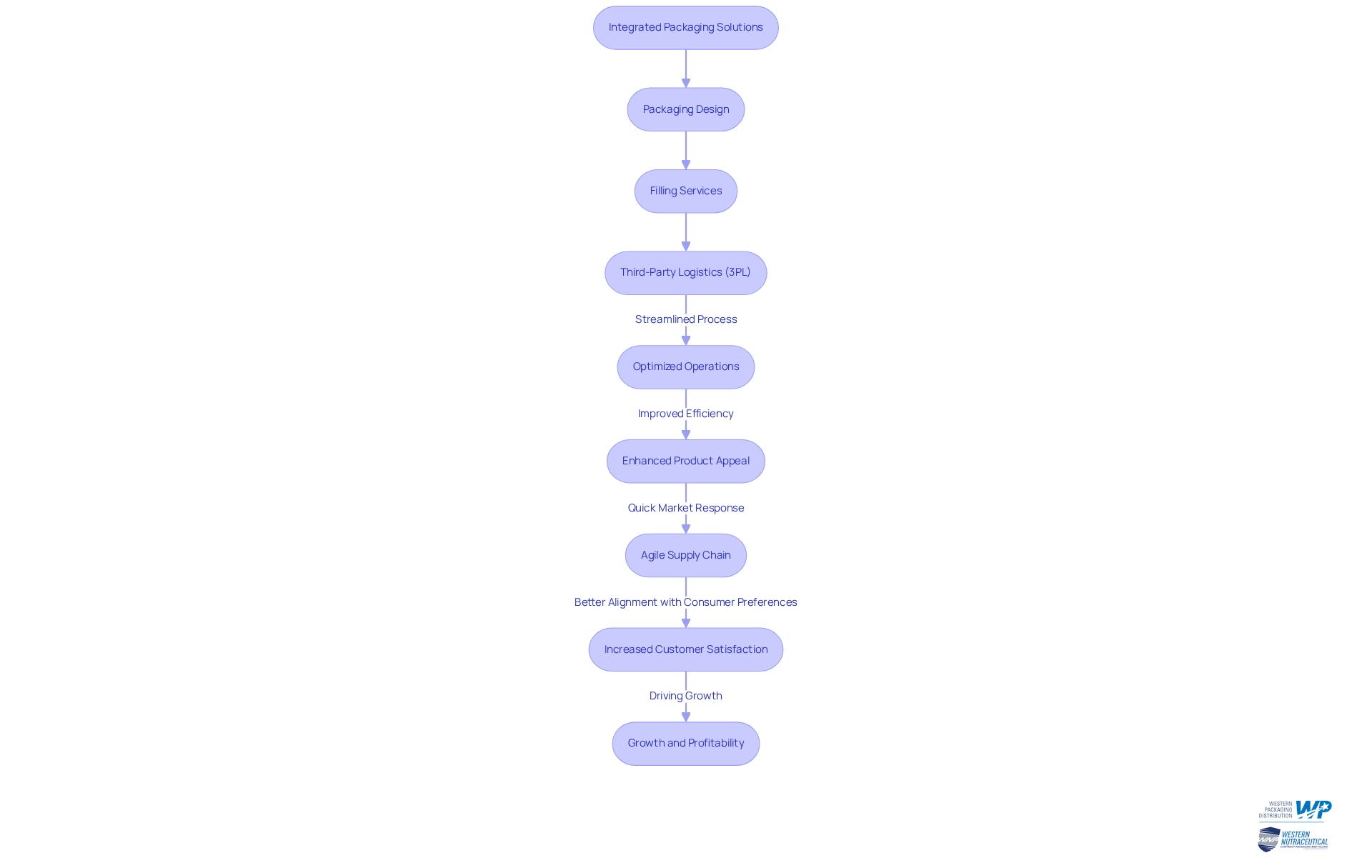
Real-Time Visibility: Improve Operational Efficiency in Your Supply Chain
Implementing real-time visibility solutions in the supply chain empowers nutraceutical companies to meticulously track and trace pharmaceuticals at every stage, from production to delivery. This capability significantly enhances operational efficiency and enables rapid responses to disruptions or delays.
By leveraging technologies such as RFID and IoT, businesses can achieve precise tracking of inventory levels, optimize stock management, and ensure timely delivery of goods. This proactive approach not only elevates customer satisfaction but also cultivates loyalty, as consumers increasingly demand transparency and reliability in their supply chain interactions.
Companies equipped with superior supply chain visibility are more likely to retain customers due to this transparency. For instance, RFID technology automates inventory management, reducing the need for manual labor and enhancing accuracy, while IoT devices provide real-time data on item conditions, further improving logistics efficiency.
Real-time visibility enhances operational efficiency by streamlining processes and minimizing the time and effort required to manage supply chains. The integration of these technologies is revolutionizing how nutraceutical firms manage their inventory and logistics to effectively track and trace pharmaceuticals, ultimately resulting in a more resilient and responsive supply chain.
As noted by Lowry Solutions, "Experience the advantages of real-time data accuracy and operational efficiency and position your business for sustained success.
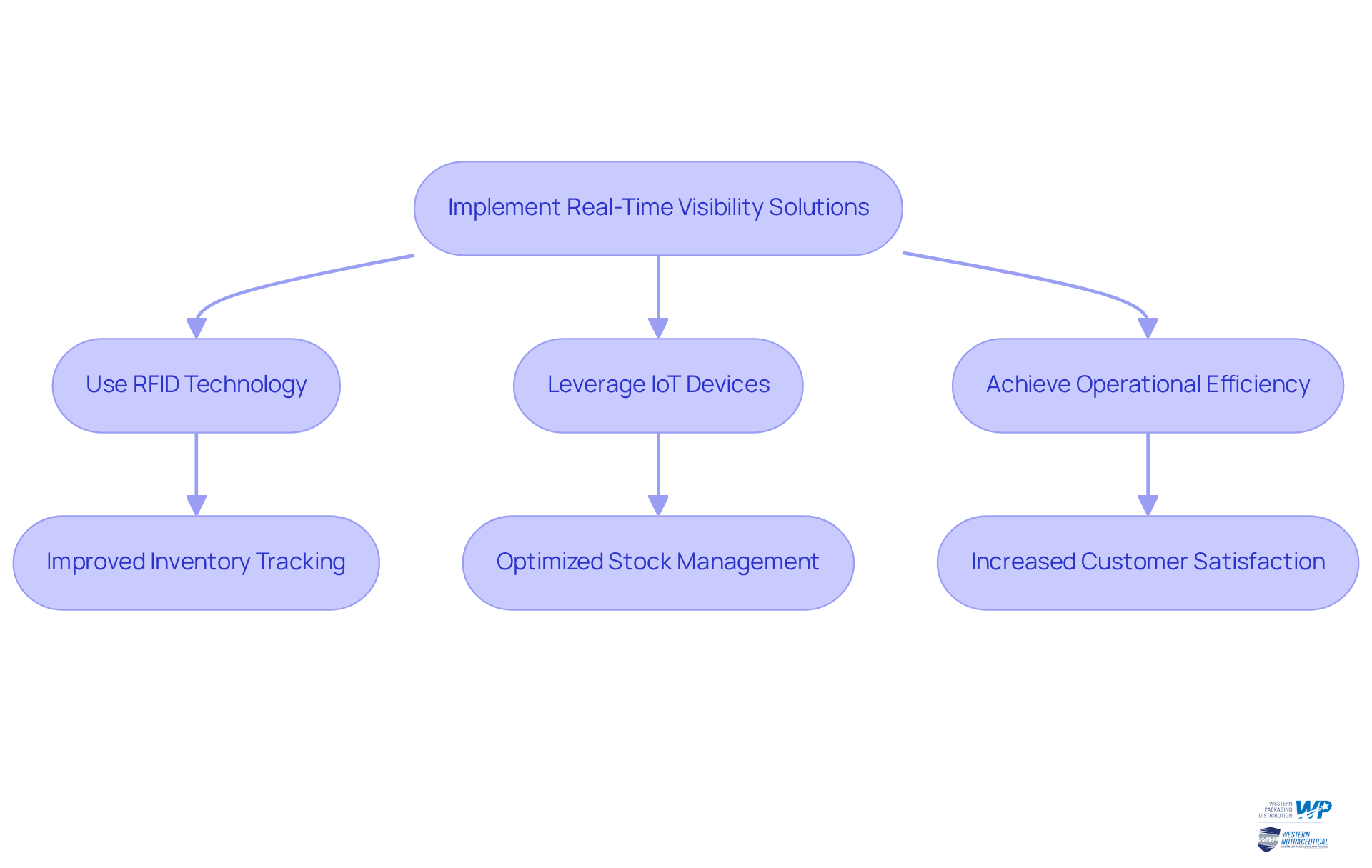
Regulatory Compliance: Ensure Adherence to Industry Standards
Nutraceutical firms must navigate a complex regulatory environment to ensure their offerings meet industry standards. By utilizing track and trace pharmaceuticals methods, businesses can ensure adherence to regulations like the Drug Supply Chain Security Act (DSCSA). These frameworks provide a clear log of product movement, assisting companies in swiftly recognizing and resolving any compliance concerns.
Ensuring regulatory compliance not only protects consumers but also enhances brand reputation and trust in the marketplace. In fact, organizations with high non-compliance face an average data breach cost of USD 5.05 million, underscoring the financial implications of neglecting compliance. Moreover, 66% of users have indicated faster sales cycles as a direct advantage of effectively employing these solutions.
As Lesley O’Connor, Senior Manager of Regulatory Affairs, states, "Regulatory compliance and brand reputation go hand-in-hand." To navigate these complexities, nutraceutical manufacturers should prioritize the integration of advanced technologies to track and trace pharmaceuticals and stay updated on compliance requirements to achieve long-term success.
![]()
Counterfeit Prevention: Enhance Drug Safety and Trust
The surge in counterfeit nutraceuticals necessitates the adoption of robust prevention strategies. Track and trace pharmaceuticals technologies are crucial in this battle, providing secure methods to confirm the authenticity of items. By assigning unique identifiers to each product, these frameworks enable comprehensive tracking from production to end-user, significantly enhancing drug safety.
For instance, DrugXafe's implementation of 2D Data Matrix codes allows for meticulous tracking of pharmaceuticals, effectively blocking counterfeit and substandard drugs from entering the market. Notably, DrugXafe has managed over 35 billion pharmaceuticals and caters to more than 65,000 stakeholders, highlighting the extensive acceptance and confidence in this platform. This capability not only safeguards buyers but also strengthens brand reputation in a competitive environment.
As emphasized by industry experts, the integration of advanced tracking technologies is essential for maintaining trust and ensuring compliance with stringent regulations that require track and trace pharmaceuticals. Furthermore, with 60 to 70% of dietary supplements in India being unregistered, unapproved, or counterfeit, the urgency of implementing track and trace pharmaceuticals solutions becomes even more apparent.
Ultimately, the effectiveness of track and trace pharmaceuticals in preventing counterfeiting is crucial for safeguarding public health and enhancing the overall integrity of the nutraceutical industry.
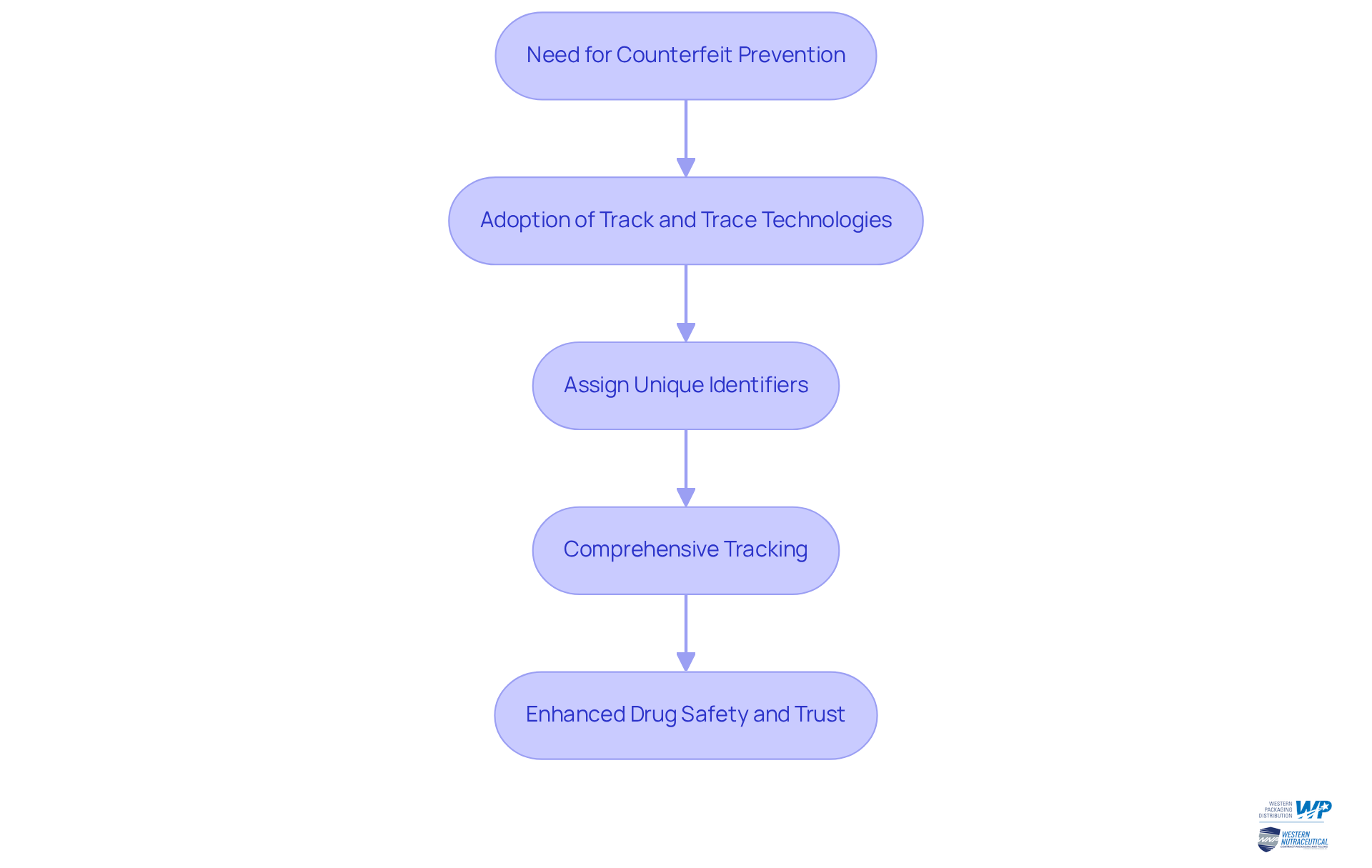
Inventory Management: Streamline Processes and Reduce Errors
Implementing advanced inventory management solutions empowers nutraceutical firms to optimize their operations and minimize errors. By utilizing automated tracking and data analytics, businesses can maintain optimal inventory levels, reduce stockouts, and limit excess inventory. This proactive strategy not only enhances operational efficiency but also ensures that products are available when customers need them, ultimately leading to increased sales and heightened customer satisfaction.
For instance, companies employing RFID technology report an impressive 97% inventory accuracy, demonstrating the effectiveness of automated tracking in minimizing discrepancies. Furthermore, organizations utilizing real-time inventory management systems experience a 25% reduction in storage costs and up to 30% faster order processing, highlighting the broader advantages of these systems.
Additionally, implementing integrated order processing can elevate productivity by 25% and improve stock usage efficiency by 30%, further underscoring the significant impact of automated tracking on inventory management. As Peter Drucker aptly stated, "Efficiency is Doing Things Right; Effectiveness is Doing the Right Things," underlining the critical importance of accurate inventory management in sustaining customer trust and satisfaction.
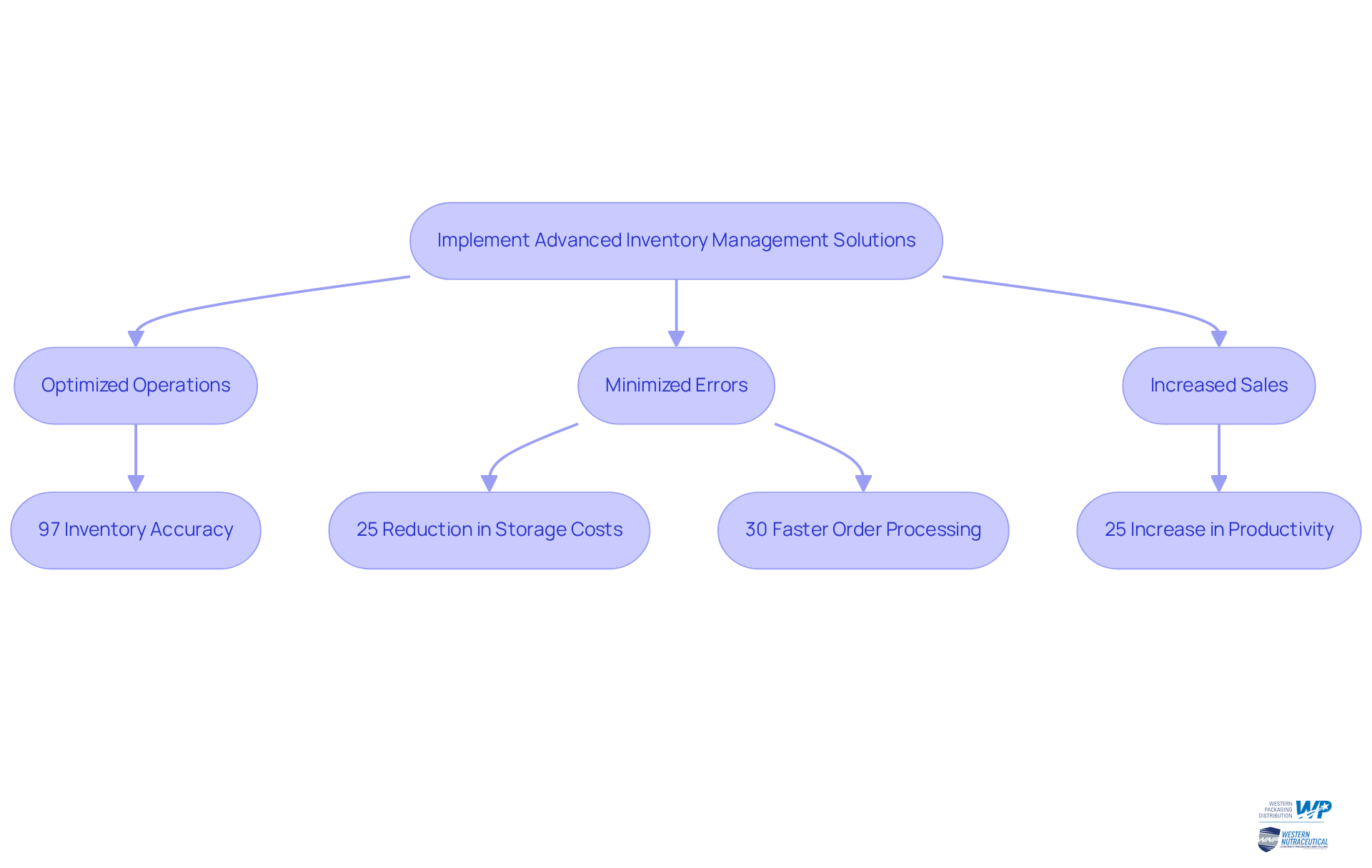
Supply Chain Transparency: Build Trust with Consumers and Stakeholders
Supply chain transparency is essential for cultivating trust among consumers and stakeholders in the nutraceutical industry. By offering detailed insights into sourcing, production processes, and product safety, companies can significantly enhance their credibility and foster customer loyalty. Implementing robust traceability systems enables businesses to track and trace pharmaceuticals, allowing them to share this vital information seamlessly and showcasing their commitment to quality and ethical practices.
This degree of transparency not only corresponds with customer expectations but also positions brands as industry leaders. Brands that successfully convey their sourcing practices have observed heightened customer loyalty and a readiness among buyers to pay extra for transparency. Indeed, 71% of buyers are ready to pay extra for items from clear and reliable companies, highlighting the financial motivation for implementing traceability methods.
Furthermore, almost 80% of buyers regard traceability as essential for food safety and validating product claims. Companies that prioritize track and trace pharmaceuticals not only mitigate risks associated with compliance failures but also enhance their reputation by demonstrating accountability and ethical sourcing. As Eashan Mehta noted, 'Supply chain transparency isn’t just a nice-to-have — it’s a critical component for building trust and maintaining credibility.'
Additionally, leveraging technologies like QR codes and blockchain can further strengthen the ability to track and trace pharmaceuticals. As the nutraceutical market continues to expand, the incorporation of track and trace pharmaceuticals frameworks will be crucial in forming enduring connections with value-oriented buyers. Nutraceutical producers should assess their existing sourcing methods and contemplate adopting systems for track and trace pharmaceuticals to boost public trust and brand loyalty.
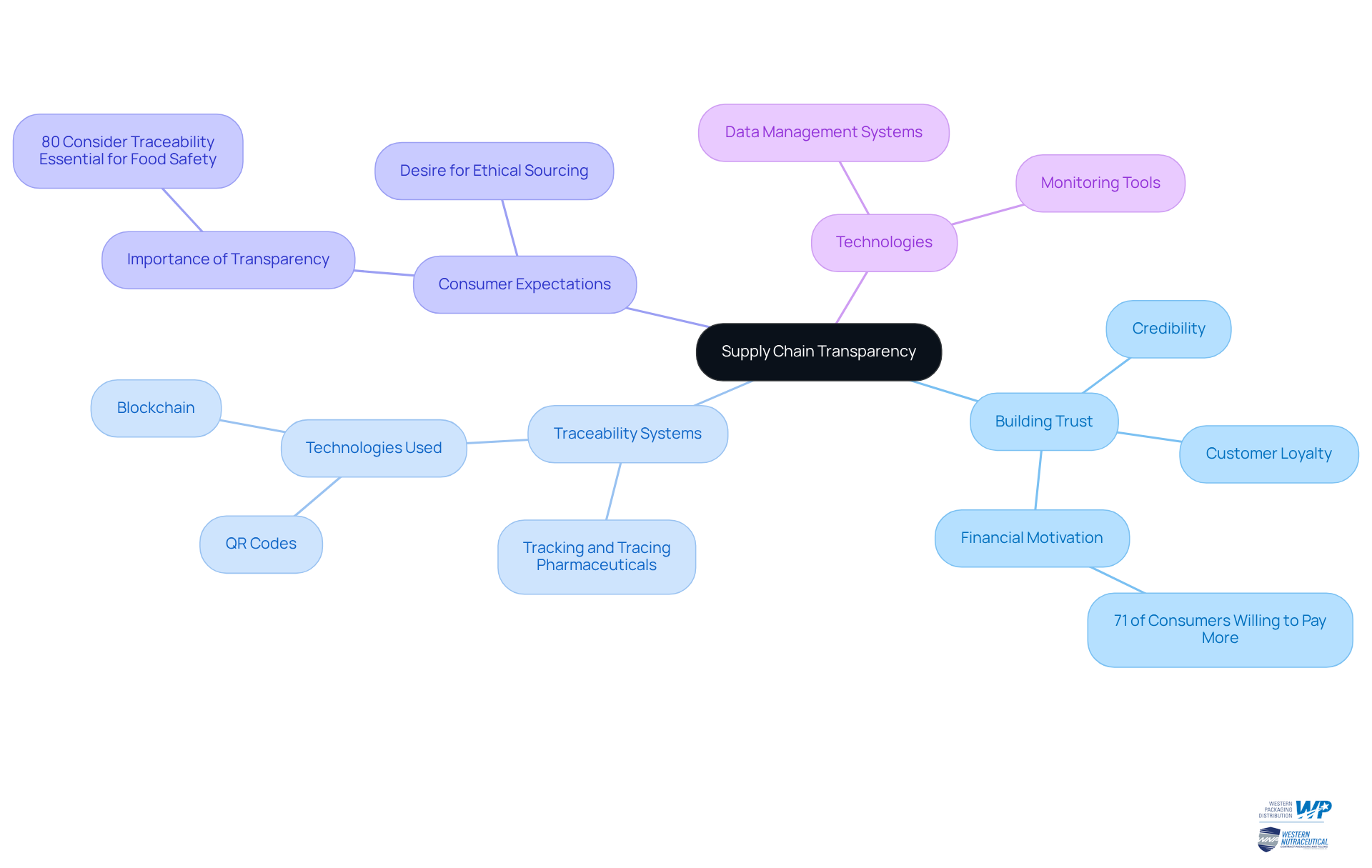
Enhanced Data Management: Drive Better Decision-Making
Enhanced data management practices empower nutraceutical firms to make informed decisions that drive success. By leveraging data analytics and reporting tools, businesses uncover valuable insights into customer preferences, market trends, and operational performance. This analytical approach enables firms to refine their strategies, improve product offerings, and swiftly adapt to market dynamics. In an industry marked by rapid evolution, data-driven decision-making is essential for maintaining a competitive edge.
Consider the dietary supplements sector, which accounted for a significant revenue share of 32.6% in 2024, underscoring the necessity for businesses to utilize data to understand customer needs and preferences. Moreover, the global nutraceuticals market was valued at USD 591.1 billion in 2024 and is projected to reach USD 636.2 billion in 2025, with a robust CAGR of 7.6% from 2025 to 2030. Effectively harnessing data will be crucial for navigating this competitive landscape.
Organizations that prioritize data analytics not only enhance their operational efficiency but also position themselves to capitalize on emerging trends and customer demands. As Geoffrey Moore aptly states, "data is absolutely crucial to making smart business decisions." Furthermore, businesses face potential losses of $5.2 million in revenue due to untapped data, emphasizing the financial implications of not utilizing data analytics effectively.
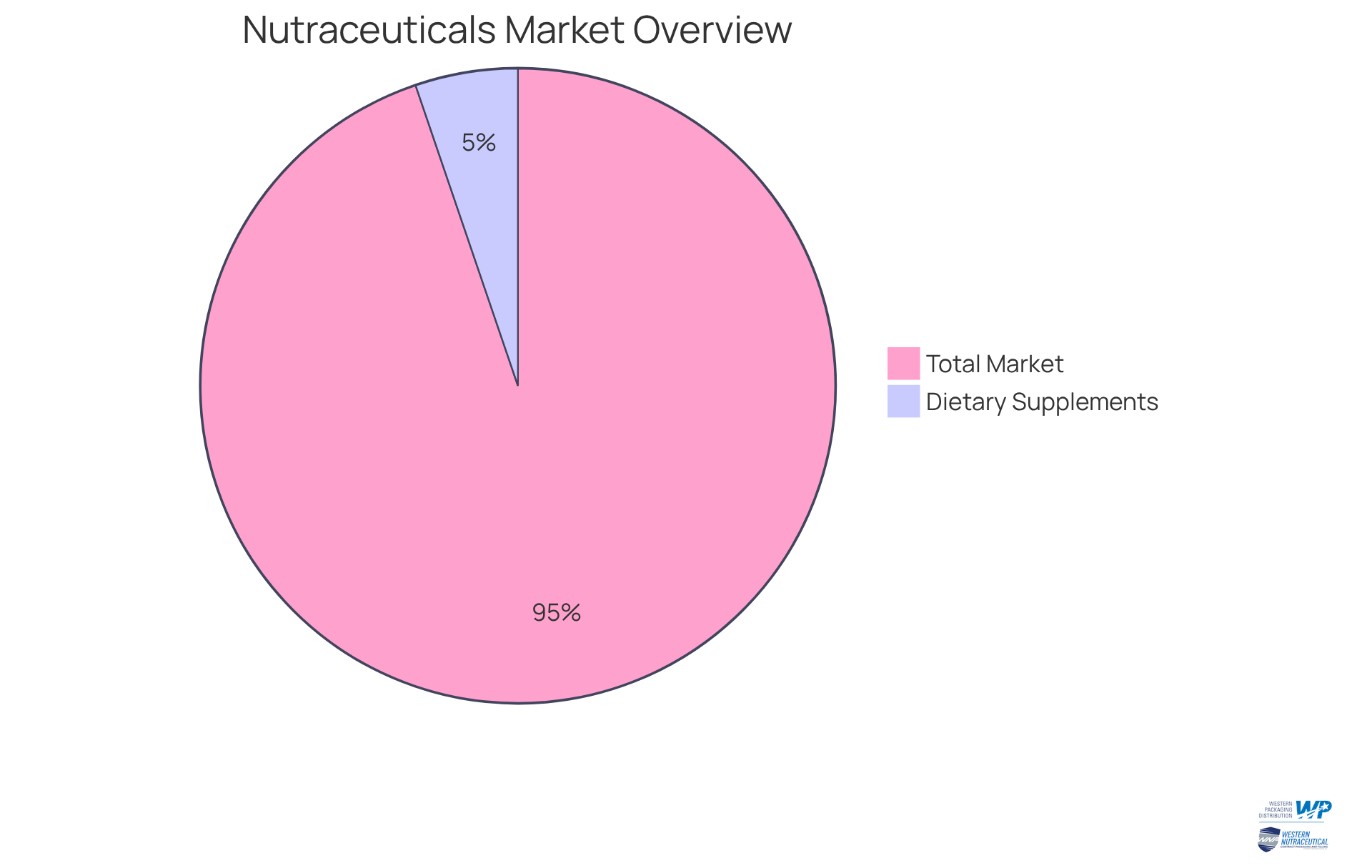
Product Recall Management: Ensure Safety and Compliance
A robust recall management framework is indispensable for nutraceutical firms aiming to uphold safety and compliance standards. This framework must encompass clearly defined procedures for:
- Identifying affected products
- Promptly informing customers
- Collaborating with regulatory authorities
By proactively preparing for potential recalls, companies can significantly mitigate risks to public safety while safeguarding their brand reputation. Effective recall management not only complies with regulatory standards but also exemplifies a strong commitment to customer welfare.
As Benjamin Franklin aptly stated, 'An ounce of prevention is worth a pound of cure,' emphasizing the importance of proactive measures in maintaining safety and compliance during recalls. Furthermore, the notable 31.5% reduction in product recalls during Q2 2025, marking the lowest quarterly level in three years, illustrates the positive impact of implementing best practices in recall procedures, thereby enhancing public trust and safety perceptions within the nutraceutical industry.
Additionally, it is acknowledged that 'Safety work is today recognized as an economic necessity,' highlighting the critical role of effective recall management in fostering brand loyalty and consumer confidence.
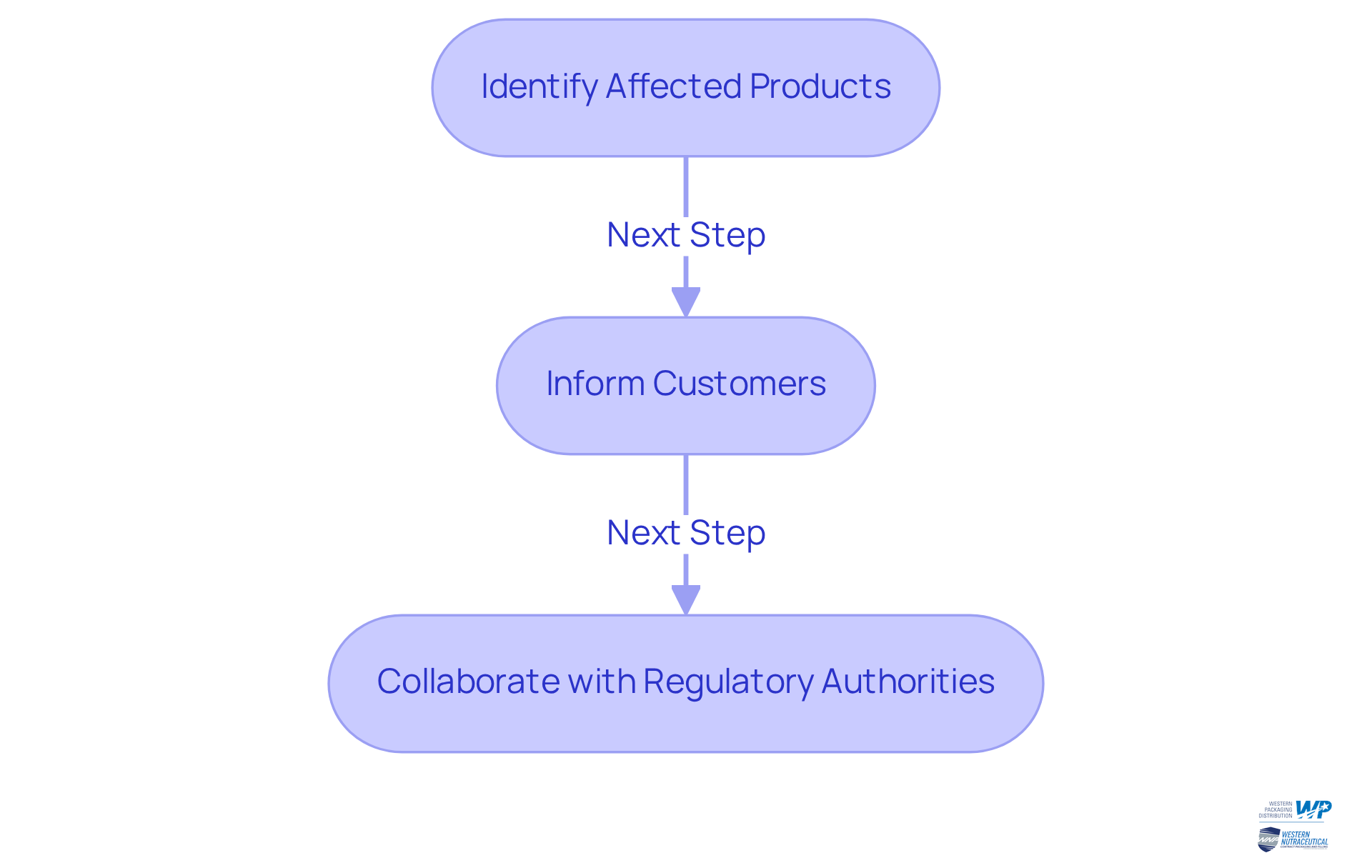
Cost Savings: Achieve More Efficient Operations
By optimizing supply chain processes and implementing advanced technologies, nutraceutical firms can realize substantial cost savings. Streamlining operations, minimizing waste, and enhancing inventory management are essential strategies for boosting efficiency. These enhancements not only reduce operational costs but also elevate profitability, empowering businesses to invest in growth and innovation. In a fiercely competitive market, achieving cost efficiency is vital for sustaining long-term success.
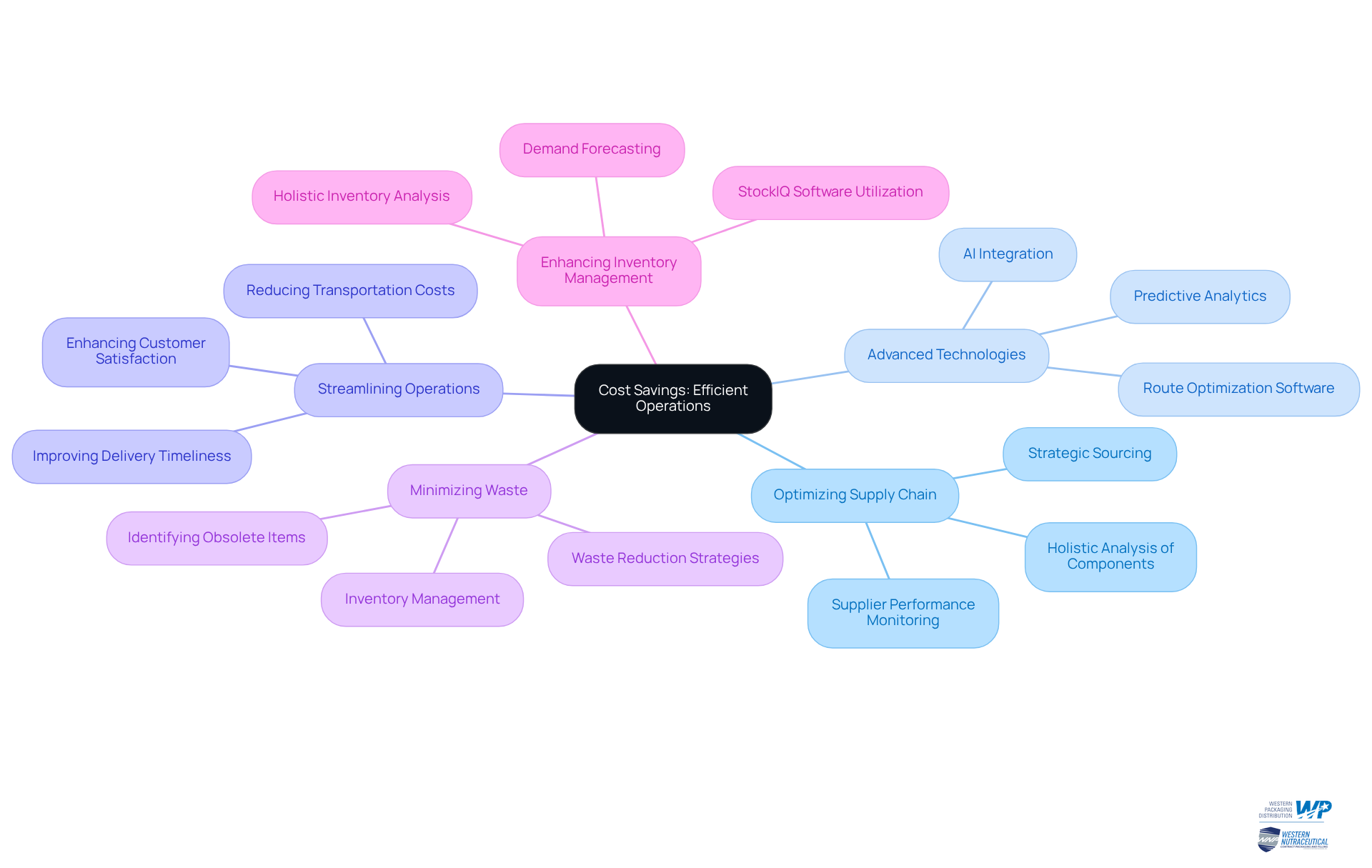
Competitive Advantage: Position Your Company as a Leader in Safety and Innovation
To establish leadership in the nutraceutical sector, organizations must prioritize safety and innovation within their supply chain practices. Implementing advanced methods to track and trace pharmaceuticals is essential for ensuring regulatory compliance and maintaining high-quality standards. This proactive approach not only differentiates businesses from their competitors but also significantly enhances brand reputation.
For instance, organizations such as Danone and Nestlé have set benchmarks in safety standards and transparency through their robust track and trace pharmaceuticals systems. As consumers increasingly seek transparency and quality in their purchasing choices, it is imperative for businesses to adopt these practices.
As Peter Drucker stated, 'Knowledge has become the dominant source of competitive advantage in the economy.' By fostering a culture of safety and innovation, organizations can build trust and loyalty among health-conscious consumers, ultimately driving growth and success in a competitive market.
To effectively implement these strategies, companies should:
- Regularly assess their safety protocols
- Engage employees in discussions about safety practices
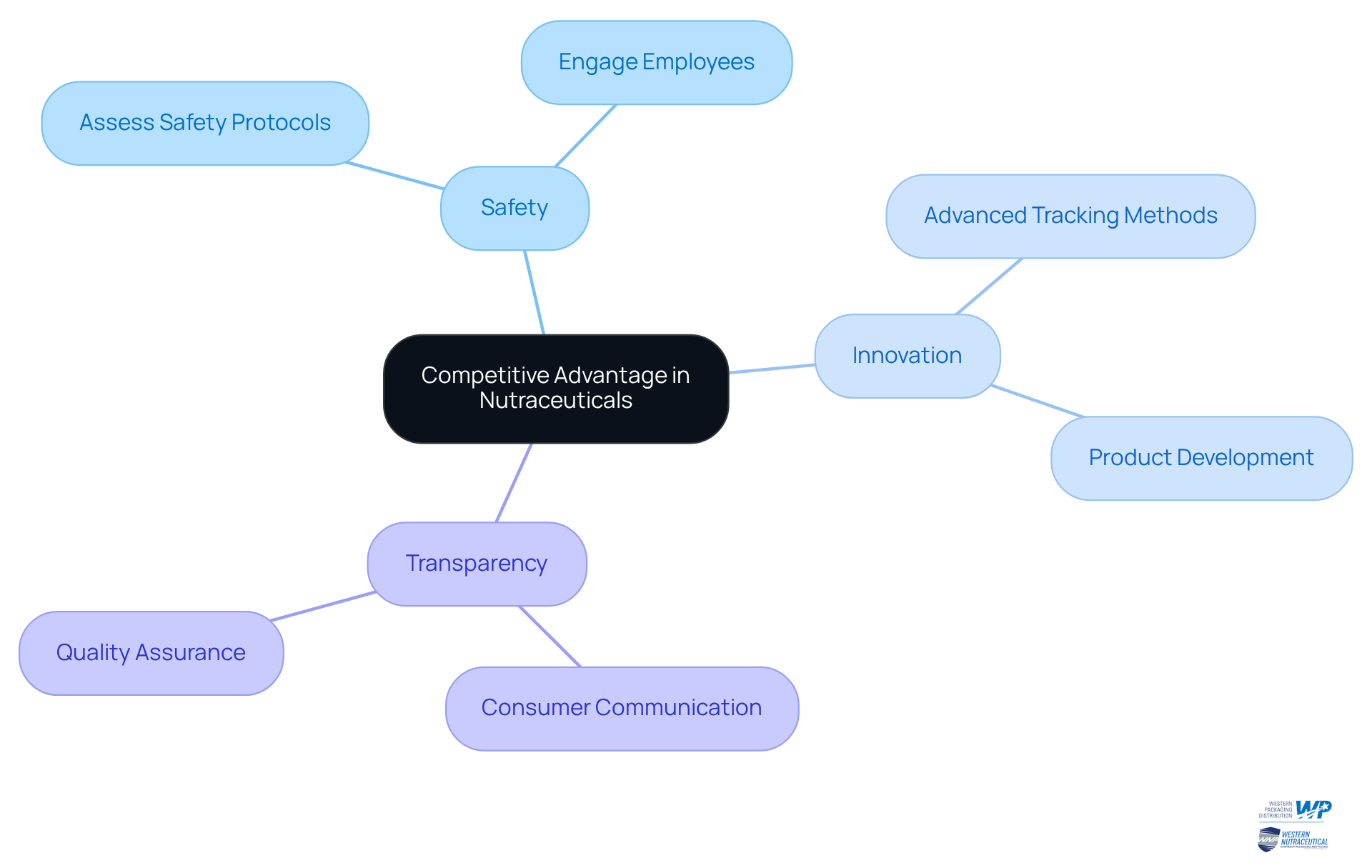
Conclusion
The integration of track and trace pharmaceuticals within the nutraceutical industry presents a wealth of advantages that significantly enhance operational efficiency, compliance, and consumer trust. By embracing these advanced technologies, companies can streamline their supply chains, safeguard their products against counterfeiting, and ensure adherence to stringent regulations. This comprehensive approach empowers businesses to excel in a competitive marketplace while prioritizing safety and innovation.
Key insights from the article underscore the critical importance of:
- Real-time visibility
- Effective inventory management
- Robust recall strategies
Companies that leverage RFID and IoT technologies achieve greater accuracy and responsiveness in their operations, translating to improved customer satisfaction and brand loyalty. Moreover, the focus on regulatory compliance and transparency not only mitigates risks but also bolsters brand reputation, fostering deeper connections with consumers.
Ultimately, the implementation of track and trace pharmaceuticals transcends mere compliance; it is a strategic imperative that propels growth and enhances the overall integrity of the nutraceutical sector. As the industry continues to evolve, prioritizing these practices will be essential for organizations seeking to build trust, maintain a competitive edge, and ensure the safety of their products. Embracing these changes will benefit not only individual businesses but also contribute to a healthier and more transparent nutraceutical market for all stakeholders involved.
Frequently Asked Questions
What services does Western Packaging offer to nutraceutical businesses?
Western Packaging provides integrated packaging solutions that include packaging design, filling services, and third-party logistics (3PL) to streamline the supply chain for nutraceutical businesses.
How does Western Packaging enhance supply chain efficiency?
By merging various packaging services, Western Packaging reduces lead times, improves product appeal, and allows businesses to focus on their core competencies, ultimately leading to enhanced operational efficiency and reduced costs.
What are the benefits of implementing real-time visibility in the supply chain?
Real-time visibility allows nutraceutical companies to track and trace pharmaceuticals throughout the supply chain, enhancing operational efficiency, enabling rapid responses to disruptions, and improving customer satisfaction through transparency and reliability.
What technologies are utilized for real-time visibility in supply chains?
Technologies such as RFID and IoT are used to achieve precise tracking of inventory levels, optimize stock management, and provide real-time data on item conditions.
Why is regulatory compliance important for nutraceutical firms?
Regulatory compliance ensures that nutraceutical products meet industry standards, protects consumers, enhances brand reputation, and helps avoid significant financial penalties associated with non-compliance.
How can nutraceutical companies ensure adherence to regulations like the Drug Supply Chain Security Act (DSCSA)?
By utilizing track and trace methods for pharmaceuticals, companies can maintain clear logs of product movement and quickly address any compliance concerns.
What are the financial implications of non-compliance for nutraceutical firms?
Organizations that fail to comply with regulations face an average data breach cost of USD 5.05 million and may experience slower sales cycles.
How can advanced technologies aid in regulatory compliance for nutraceutical manufacturers?
Advanced technologies can help track and trace pharmaceuticals effectively, ensuring that companies stay updated on compliance requirements and maintain adherence to industry standards.




